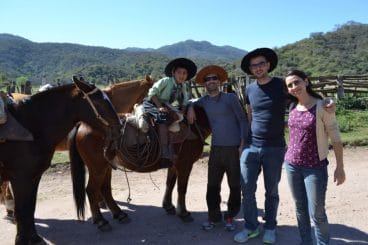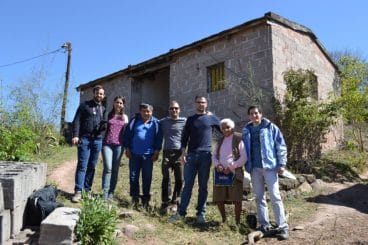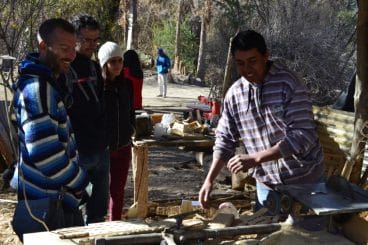 The solidarity tourism project that the Ministry of Tourism of Salta, Argentina has been promoting for six years supports small communities in the cities of Salta, Jujuy and Catamarca in the north of the country. It is enhancing the region’s natural resources in order to save the cultural richness and diversity that is linked to local history. At the same time, it offers professional training for the production of products related to the sectors of tourism, housing, transport and the sale of handicrafts and food products (jams, liqueurs, honey, and more). This has helped to avoid the migration of populations from rural areas to urban ones, preventing the increase of poverty areas in the big cities while protecting small communities that have a rich culture that is disappearing.
The solidarity tourism project that the Ministry of Tourism of Salta, Argentina has been promoting for six years supports small communities in the cities of Salta, Jujuy and Catamarca in the north of the country. It is enhancing the region’s natural resources in order to save the cultural richness and diversity that is linked to local history. At the same time, it offers professional training for the production of products related to the sectors of tourism, housing, transport and the sale of handicrafts and food products (jams, liqueurs, honey, and more). This has helped to avoid the migration of populations from rural areas to urban ones, preventing the increase of poverty areas in the big cities while protecting small communities that have a rich culture that is disappearing.  “What distinguishes this experience of development from other types of experiences,” sociologist Virginia Osorio from the Sumá Fraternidad explains, “are the words “communion” and “dialogue”. Communion, because each actor has put his or her own talents and resources in common for the development of the project; dialogue, because throughout the development process, there was strong interaction between the different components who were often in conflict with one another. Difficulties were never lacking, but the strategy used to overcome those difficulties was to work in squads and practice active listening among parties: the local community, the State, businesses and other types of civil organisations.” She went on to say: “The result of this experience has been the birth of a new product and of a new kind of consumer. It’s not the idea of tourism that we have been used to. In this experience there is the added value of contact with the rich cultural wealth of small rural communities and, in several cases, of the descendents of indigenousness peoples. This type of tourism creates encounter among people among people.”
“What distinguishes this experience of development from other types of experiences,” sociologist Virginia Osorio from the Sumá Fraternidad explains, “are the words “communion” and “dialogue”. Communion, because each actor has put his or her own talents and resources in common for the development of the project; dialogue, because throughout the development process, there was strong interaction between the different components who were often in conflict with one another. Difficulties were never lacking, but the strategy used to overcome those difficulties was to work in squads and practice active listening among parties: the local community, the State, businesses and other types of civil organisations.” She went on to say: “The result of this experience has been the birth of a new product and of a new kind of consumer. It’s not the idea of tourism that we have been used to. In this experience there is the added value of contact with the rich cultural wealth of small rural communities and, in several cases, of the descendents of indigenousness peoples. This type of tourism creates encounter among people among people.”  Stefano, a young Italian tourist who participated in the programme, reports: “I feel like for some people travelling is like looking at the world from a glass box. We travel in search of our Western standard, with our comforts, our certainties and securities. We go to “consume,” as if visiting places was like stopping to have a drink and then throwing the cup away. Many photos are taken, many souvenirs are bought, you eat at some local eatery and the game is over! A nation is not made of monuments and souvenirs, but of people that can offer hospitality, sharing their homes, their dinner tables, their music: this is the real way to travel! ‘Share’, Argentina!” The family of María José e Pablo from Argentina recount: “We liked this idea of vacation, taking walks, getting to know sites, but most of all the opportunity to meet these ‘human sites’ that at times are hidden in the background of the postcards … which allowed us to enter into the local reality of those communities. We had the strong feeling throughout this experience of breaking free from our scheme of things and filling our life with those people whom we now hold in our heart; experiencing the profound and tranquil rhythm of those places, and the scenery of many places we passed through on our trip. Now, as we return to the city, we look at daily life differently, with new eyes.”
Stefano, a young Italian tourist who participated in the programme, reports: “I feel like for some people travelling is like looking at the world from a glass box. We travel in search of our Western standard, with our comforts, our certainties and securities. We go to “consume,” as if visiting places was like stopping to have a drink and then throwing the cup away. Many photos are taken, many souvenirs are bought, you eat at some local eatery and the game is over! A nation is not made of monuments and souvenirs, but of people that can offer hospitality, sharing their homes, their dinner tables, their music: this is the real way to travel! ‘Share’, Argentina!” The family of María José e Pablo from Argentina recount: “We liked this idea of vacation, taking walks, getting to know sites, but most of all the opportunity to meet these ‘human sites’ that at times are hidden in the background of the postcards … which allowed us to enter into the local reality of those communities. We had the strong feeling throughout this experience of breaking free from our scheme of things and filling our life with those people whom we now hold in our heart; experiencing the profound and tranquil rhythm of those places, and the scenery of many places we passed through on our trip. Now, as we return to the city, we look at daily life differently, with new eyes.”
Put love into practice
Put love into practice




0 Comments